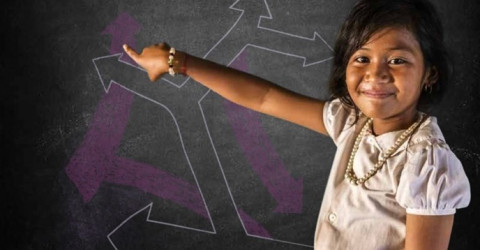
GCED Basic Search Form
Quick Search
Вы здесь
Новости

In some societies, children are led to believe that the absence of the rule of law is not just common, but acceptable. Even in countries where the rule of law is well-established, frequent corruption scandals and spiraling social inequalities means that young people are losing trust in politicians and the institutions of justice and democracy.
Education has a key role to play in empowering students to understand their fundamental rights, and to become champions for justice in society. Therefore, UNESCO in partnership with UNODC, has developed two handbooks, one aimed for primary and one for secondary schools to help teachers empower their students.
“We piloted the handbooks in schools that are members of the UNESCO Associated Schools Network (ASPnet) in 10 countries (Spain, Brazil, Burkina Faso, Indonesia, Lebanon, Nigeria, the Philippines and Slovenia) and received positive feedback from both students and teachers,” says Cecilia Barbieri, chief of UNESCO’s Global Citizenship Education Section.
Ayi Joseph, a 15–year-old student from Nigeria felt inspired by what he learnt:
‘The ideal future, devoid of crime, terrorism, violence is in our hands, we should make the change now.’
The exercises build students’ awareness of their rights, and break down misconceptions surrounding law and justice. One student involved in the piloting revealed:
‘I thought anyone in a leadership position could just make a law and force others to obey. I didn’t know that rules have processes.’
Interactive lessons
The lessons in the handbooks are interactive: democracy is demonstrated, as students participate in mock elections or take on the roles of judges – jurors - local mayors and refugees. Games and story-telling help bring social issues to life, prompting students to take a moral stand. For some, this was their first experiences of interactive learning. Teachers instruct their classes to push the desks against the walls, to engage in role-play and to debate real-life issues. One primary-aged pupil said:
‘It’s almost like in the real world’
The handbooks are designed to help teachers develop students’ critical thinking and empathy – two important skills which are often not core learning objectives within school curricula. One secondary school teacher felt they succeeded in doing this:
‘This kind of activity helps students to think bigger. It helps them see they’re part of a wide community that’s working around the clock to establish a culture of peace.’
One of the main aims of the primary schools handbook.is to convey the message that one is never too young to start developing a moral compass.
‘Right is what you should do even if no one does it, while wrong is the act you should try to avoid’, as one child observed.
Learning through games
Diminishing Islands is a game young children love to play. It teaches them about common causes for conflict, and about the need to work together without resorting to violence. Children occupy ‘islands’ of newspaper on the classroom floor, but as the game develops their ‘islands’ disappear, and they find themselves crowded onto just a few islands, until at the end, most are ‘out’. Afterwards, the teacher leads the class in reflection on how the game made them feel, and on how it relates to real life challenges - war, migration, poverty, inequality. One primary aged child who played this game learnt a valuable lesson about working together:
‘We have to do our best to help one another to survive because I don’t want to be alone on an island’.
Some of the lessons in the handbooks are rooted in history and local culture, building students’ understanding of how national laws evolve and societies learn to resolve conflict and live together. There are lessons on how the norms in the African Charter on Human and Peoples’ Rights were refined over time, or on the Charter of Manden, one of the earliest sources on fundamental human rights, which was passed down through Malian oral tradition. Historical sources like these help students understand that co-operation has always involved peaceful and inclusive dialogue:
‘Life is all about creating balance and space for yourself and others’, was the view of one secondary-school pupil.
Other lessons equip students with the skills they need to navigate the digital age. Our partner, the UNODC worked with the government of El Salvador to develop a set of learning resources on cybersecurity, privacy, cyberbullying, grooming, sexting and sextortion.
The activities in handbooks are rooted in Global Citizenship Education, an approach which can help foster young people's trust in public institutions, transforming them into agents of change instead of allowing feelings of disenfranchisement and victimhood to fester. UNESCO works with the UNODC to promote the rule of law, democracy and human rights through education.
URL:
https://en.unesco.org/news/empowering-students-just-societies-new-resource-teachers
